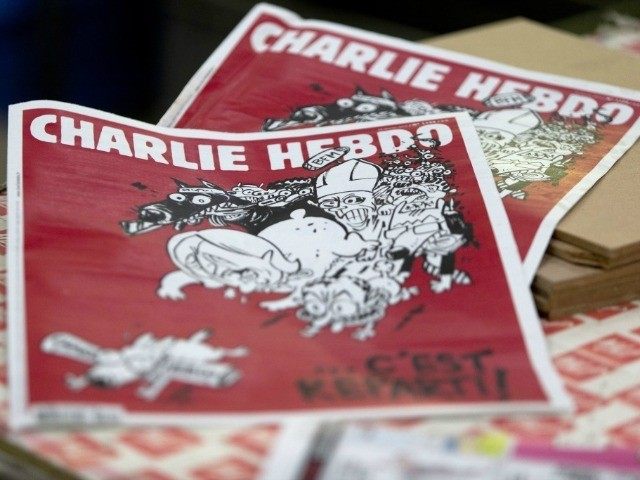The best-selling issue of Charlie Hebdo that drew much attention—not all of it flattering—for a cover cartoon of (presumably) Mohammed holding up a “Je Suis Charlie” sign was a special edition of the magazine. Its first regular issue since the massacre of its editors and staff by Islamist gunmen is due on Wednesday.
According to RawStory, the cover will depict “the Pope, a jihadist, former president Nicolas Sarkozy and far-right politician Marine Le Pen as a pack of enraged animals chasing after a dog with a copy of Charlie Hebdo clamped in its jaws,” under the headline “We’re back!” (NBC News translates the headline as “Here we go again!,” which is much funnier.)
The new issue will have more material on terrorists—the new chief editor, Gerard Biard, mentions the assault on the free speech conference and synagogue in Copenhagen as a topic that will be covered, but they will also have an interview with Greek finance minister Yanis Varoufakis and former IMF head Dominique Strauss-Kahn, whose recent legal misadventures should offer plenty of material for mockery. Or maybe they will take Varoufakis and Strauss-Kahn seriously. It is hard to tell with Charlie Hebdo. They like to be unpredictable.
A melancholy note is struck at the end of the RawStory piece, when Biard explains that he is still looking for new headquarters for his magazine, but must take security into account as a paramount concern. Also unhappy is the Wall Street Journal account of dissension among the staff and editors over how to handle the sudden influx of cash from the astounding sales of the “Je Suis Charlie” special issue.
The magazine was actually teetering on the verge of bankruptcy before the massacre brought fortune and fame. Formerly worthless shares of its profit are suddenly valuable, as the special edition sold over as well as its normal issues, bringing in another 250,000 new annual subscribers. Even as staffers clamor for a bigger piece of the company pie, critics of the magazine grouse that all this fussing over money is unseemly for what is, at heart, a left-wing publication.
The dissent in Charlie Hebdo’s ranks is about more than just financial arrangements. They are wrestling with their newfound status as a symbol of free speech, worrying about whether they can sustain the new sales level, concerned about alienating some of their expanded audience with their institutional sarcasm, and of course fearful for their safety.
“Hiring and retaining staff could also prove difficult, with violent threats continuing,” the Wall Street Journal notes. “Some staff members live under round-the-clock police protection, with armored policemen wielding automatic weapons stationed in front of their homes.”
Can an institution go through an ordeal like the Charlie Hebdo massacre and remain unchanged? Should it remain unchanged? If it remains the same paper it was before those gunmen burst into its offices, it will not take long before the less spirited defenders of free speech find something to offend them and peel away. The best way to find out who really meant it when millions declared “Je suis Charlie!” is to be Charlie.

COMMENTS
Please let us know if you're having issues with commenting.